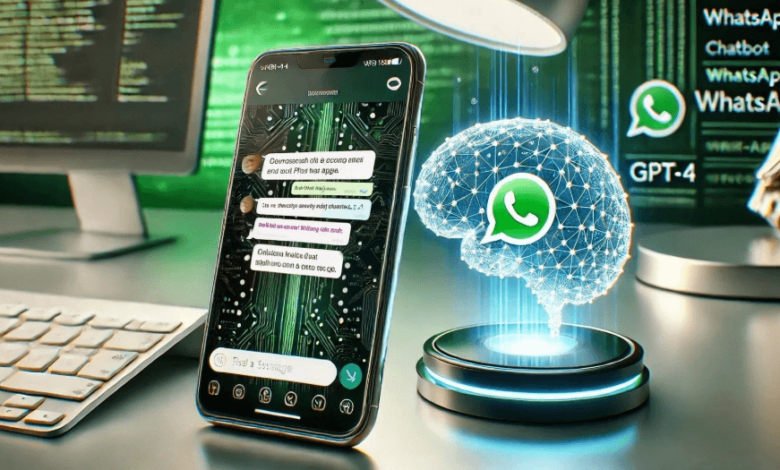How AI Could Transform WhatsApp Web in the Next 5 Years

For millions of people WhatsApp Web is the crux of their communications network. It connects them from mobile to desktop at the click of a button. It has helped us to work, stay in touch with family and manage our digital life. This isn’t true today because what we see on WhatsApp Web today largely repeats the experience that we have on our mobile phones. What is it? The next five years will see much more. From a passive platform to an intelligent communications hub fueled by artificial intelligence. AI will do more than added features. This technology will really change how we communicate on our browser.
1. The Rise of the Hyper-Intelligent Assistant
The biggest improvement will be the integration of a real AI chatbot in Masuk WhatsApp Web. For instance, imagine if you got a chatbot that answered basic questions, like, “When are we going to meet tomorrow? ” An AI chatbot would read the intent of your conversations and give you a more proactive answer. So, say you chatted with an old friend in a cafe: “What time are we heading over? It’s lunch time tomorrow? ” On the fly the chatbot could look for an answer to that query in your chat history and pull it up immediately in the chat window. So if you want to draft a response, summarize a long conversation, or suggest scheduling a reminder without leaving a tab or running another app this can all happen in WhatsApp Web.
2. Smarter Search and Instant Information Retrieval
One of the real pain points for group chats is that one can never know exactly what is going to be discussed. A date, an address, a link shared weeks ago. AI will change that. Someday, when you’re searching in the future on WhatsApp Web, you may not need to use keywords at all. You’ll be able to ask AI for a search: “Find that Italian restaurant Sarah recommended last month” and AI will recognise the context of the query, find all your chats and pull up a message which includes that word, even if it never was used before, and find the part of conversation where you’re looking.
3. Seamless Real-Time Translation
Being part of a globalized society, language is still a barrier. With AI you’ll see what AI can do to lift them down right within WhatsApp Web: Ultra-deep neural machine translation will be available to translate incoming and outgoing messages in real-time preserving both the message’s tone and the individual’s language! If for example an English speaker on WhatsApp Web were to enter an agreement for a business deal in Chinese, they would both communicate in the same language, and it would go on like that. This will open up personal and professional communication in unimaginable ways, making the world truly smaller.
See also: Precision Matters: Tuning the Tech That Watches the Road for You
4. Automated Workflows and Chatbot Integration
For businesses and power users, WhatsApp Web will become one of the most advanced automation hubs we’ve seen. In a small business, relying on AI can result in smart chatbots that answer any customer inquiry, process orders, and book appointments directly through the web interface. Meanwhile in a private setting, an individual could create an individual automation—like automatically saving all photos shared in one specific group chat to a designated cloud folder or automatically forwarding an urgent message from a boss to a Slack channel. AI would drive the automations and help make WhatsApp Web an ideal hub for digital task management.
5. Enhanced Media Management and Creation
Next, we’ll see a big change in how media is processed on WhatsApp Web. An AI could automatically categorize and create albums from the photos and videos that are shared in a chat—create captions for images, make highlight reels of a weekend-long trip captured in a family group—or even upscale low-resolution images. And the most radical thing is that, with images and videos using the generative AI, user-generated editing tools could allow users to quickly touch up a picture and make a custom sticker out of a photo—without ever leaving the chat.
6. Proactive Security and Spam Prevention
As attacks become more sophisticated, so too will our defences. AI will provide a very powerful security element to WhatsApp Web, as it can categorize patterns and the content of messages in real-time and can quickly identify and quarantine phishing attempts, spam and misinformation links much more effectively than current systems do, and tell users when they are viewing unusual login activity or possibly social engineering attacks, making a platform safer for everyone, without sacrificing the ease of use what makes whatsapp Web such a pleasure to use.
7. Personalized User Experience and Accessibility
AI will enable us to create a deeply personalized experience on WhatsApp Web. For example, the UI could take into account what you’re doing and prioritize contacts for you during office hours, while highlighting family groups for late-night messaging. Also if you’re a person with a disability, then there may be new voice-to-text capabilities to help make it easier to edit group conversations that get messy, automatic alt-text generation for images, and also real-time transcription of voice messages, making WhatsApp Web more accessible and inclusive.
Conclusion: A More Connected and Intelligent Future
There will be times when AI starts to take over the role of connector in WhatsApp Web. By 2022, in five years’ time, we will see WhatsApp Web morph into an intelligent communications platform that is proactive, predictive, and context-aware. AI will make our lives easier, communication easier, communications more powerful, and the value of what we do together much deeper than just sending messages. And this future requires a big question: When will we have algorithms that not just know how to make connections but will even understand us? The future for WhatsApp Web is not always about connecting us together; it’s about understanding us and making those connections smarter.





